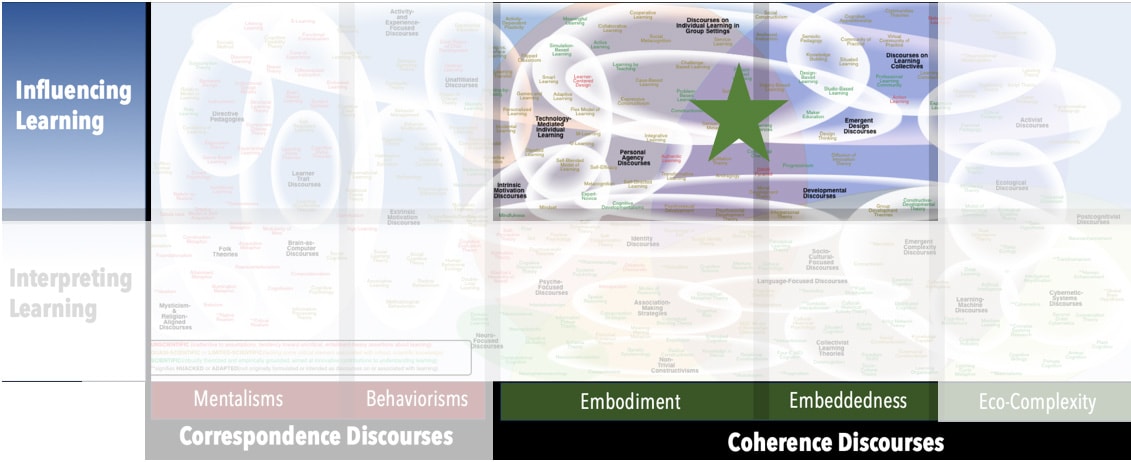Problem-Based Learning is a small-group-based classroom approach that is structured around open-ended problems. The orienting goal is not a defined solution, but the development of knowledge, communication skills, and collaborative competencies – that is, learning is seen to happen at both individual and group levels.
Learn More...Social Constructionism is based on the assertion that meanings are developed with others. The theory is focused on social constructs – that is, shared assumptions and jointly construed understandings of such notions as “money,” “atoms,” “common sense,” “self-concept,” and “reality.” The notion that is used to account for dramatically different worldviews across societies and eras.
Learn More...The Construction Metaphor frames learning in terms of individuals assembling their knowledge from bits of information received from the outside world. In its most trivial and common usage, it is a Folk Theory that is only a slight elaboration of the Acquisition Metaphor, retaining separations of inside from outside and mental from physical. More radical uses of the metaphor are encountered among Embodiment Discourses.
Learn More...Embodiment Discourses comprise perspectives on learning that refuse a separation of mental and physical. Mental and physical are understood as integrated and inseparable aspects of the body. Phrased differently, the body is not seen as something that a learner learns through, but as the learner. Correspondingly, behaviors are not seen as goals or indications of learning, but as integral elements of learning.
Learn More...Social Constructivism is a version of Constructivism in which particular attention is given to interactions with others. Those interactions are seen as integral to understanding personal construals and development. Social Constructivism shares Social Constructionism’s interest in jointly construed understandings of the world, but it is more focused on individual learning than in social constructs.
Learn More...Experiential Learning is, in essence, formalized teaching advice based on the ancient realization that humans learn by doing. Focusing on the individual, it recommends firsthand experiences that should occur in real-world environments, affording the learner concrete experience, opportunity to reflect on that experience, opportunity to develop abstract concepts based on that reflection, and opportunities to experiment to continue the cycle of learning.
Learn More...The Attainment Metaphor is prominent in current discussions of formal education. It frames knowledge as existing in discrete regions (e.g., fields, areas) to be traversed, and learning is typically framed as progressing across (and sometimes dwelling in) those regions. Learning is cast in movement-based sensibilities –e.g., as “getting there.”
Learn More...Interpreted directly, Discovery Learning is rooted in the assumption that knowledge is out there, and learning is about finding it and taking it in. That is, it is a modest elaboration of the Acquisition Metaphor, with nearly identical assumptions about knowledge, but ascribing more agency to the learner – who’s seen less as a passive receptacle and more an active agent.
Learn More...Contrasted with disassociated learning, Syntonic Learning is about engaging one’s body and senses, aiming to develop a level of self-knowledge that enables one to transpose one’s own movement in space onto an object’s movement or into a program for movement.
Learn More...Focus
Learning through making things
Principal Metaphors
- Knowledge is … competencies to make
- Knowing is … personal sense (derived from individual experience)
- Learner is … a maker (individual in action)
- Learning is … construing (through making)
- Teaching is … coaching, supporting
Originated
1990s
Synopsis
Constructionism is focused on the learning that happens through being immersed in making physical objects. Such learning is seen as participatory and situated, and it involves connecting and integrating different ideas. (Note: In some subdomains of education, Constructionism is used synonymously with Social Constructivism and/or Social Constructionism.) Associated discourses include:
- Educational Robotics (1970s) – the activity of programming robots using software provided for the purpose. Some kits for Educational Robotics include prebuilt robots, others require assembly, and some comprise components that enable users to create custom robots. Regarding educational intentions, Educational Robotics are typically used as either the focus for courses in computer programming (computational thinking) or as devices to study concepts in other disciplines (esp. mathematics and physics).
See also Syntonic Learning.
Commentary
Constructionism has been interpreted as Discovery Learning and Experiential Learning. These interpretations are more in line with the Attainment Metaphor and the Construction Metaphor.
Authors and/or Prominent Influences
Seymour Papert
Status as a Theory of Learning
Constructionism is a not theory of learning, although it is attentive to its orienting metaphors.
Status as a Theory of Teaching
Constructionism is a theory of teaching. It offers advice and describes conditions to support learning in ways that are resonant Problem-Based Learning and related theories.
Status as a Scientific Theory
With ties to Embodiment Discourses, Constructionism is associated with a significant base of empirical evidence.
Subdiscourses:
Map Location

Please cite this article as:
Davis, B., & Francis, K. (2025). “Constructionism” in Discourses on Learning in Education. https://learningdiscourses.com.
⇦ Back to Map
⇦ Back to List

